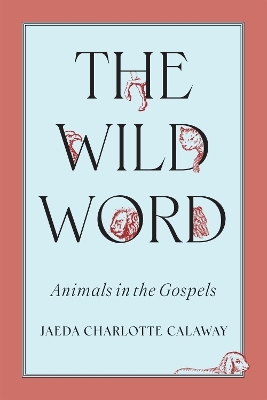
The Wild Word
Animals in the Gospels
Seiten
2025
McGill-Queen's University Press (Verlag)
978-0-2280-2471-2 (ISBN)
McGill-Queen's University Press (Verlag)
978-0-2280-2471-2 (ISBN)
- Noch nicht erschienen (ca. Juni 2025)
- Versandkostenfrei
- Auch auf Rechnung
- Artikel merken
The Wild Word presents new readings of the way animals are used in the Gospels to create, reinforce, and transgress social boundaries, as well as to enforce and collapse the categories of domesticity/wildness and natural/unnatural.
Placed in a manger as an infant, Jesus seems to have been born into a world teeming with animal life. Yet read the stories again. Does Mary ride a donkey? Does the centurion ride a horse? Animals are everywhere in the gospels, though not always in the ways we expect. Where animals are visible, their presence means more than we realize.
The Wild Word explores the gospels’ well-known, forgotten, and missing portrayals of animals. Jaeda Calaway examines the many interactions between humans and other animals in these biblical texts, first considering forms of consumption, such as eating animals, wearing animal products, working animals, and sacrificing animals. She then turns to symbolic animality: how humans assign animal traits and archetypes to other humans, how divine and demonic powers intersect with wild and domestic animals, and what queer and trans readings of gospel animals can illuminate.
Told and retold for two thousand years, the gospel stories are deeply imprinted on Western culture. The Wild Word reveals how many of their associations with animals, animality, and wildness remain with us today.
Placed in a manger as an infant, Jesus seems to have been born into a world teeming with animal life. Yet read the stories again. Does Mary ride a donkey? Does the centurion ride a horse? Animals are everywhere in the gospels, though not always in the ways we expect. Where animals are visible, their presence means more than we realize.
The Wild Word explores the gospels’ well-known, forgotten, and missing portrayals of animals. Jaeda Calaway examines the many interactions between humans and other animals in these biblical texts, first considering forms of consumption, such as eating animals, wearing animal products, working animals, and sacrificing animals. She then turns to symbolic animality: how humans assign animal traits and archetypes to other humans, how divine and demonic powers intersect with wild and domestic animals, and what queer and trans readings of gospel animals can illuminate.
Told and retold for two thousand years, the gospel stories are deeply imprinted on Western culture. The Wild Word reveals how many of their associations with animals, animality, and wildness remain with us today.
Jaeda Charlotte Calaway is a faculty librarian at Illinois College and the author of The Christian Moses: Vision, Authority, and the Limits of Humanity in the New Testament and Early Christianity.
| Erscheint lt. Verlag | 17.6.2025 |
|---|---|
| Verlagsort | Montreal |
| Sprache | englisch |
| Maße | 140 x 216 mm |
| Themenwelt | Geschichte ► Teilgebiete der Geschichte ► Religionsgeschichte |
| Religion / Theologie ► Christentum ► Bibelausgaben / Bibelkommentare | |
| Religion / Theologie ► Christentum ► Kirchengeschichte | |
| ISBN-10 | 0-2280-2471-4 / 0228024714 |
| ISBN-13 | 978-0-2280-2471-2 / 9780228024712 |
| Zustand | Neuware |
| Haben Sie eine Frage zum Produkt? |
Mehr entdecken
aus dem Bereich
aus dem Bereich
Herkunft, Blüte, Weg nach Osten
Buch | Hardcover (2024)
C.H.Beck (Verlag)
CHF 55,90
warum die Religionen erst im Mittelalter entstanden sind
Buch | Hardcover (2024)
C.H.Beck (Verlag)
CHF 53,20
Von den Anfängen bis zur Gegenwart
Buch | Hardcover (2022)
C.H.Beck (Verlag)
CHF 47,60


